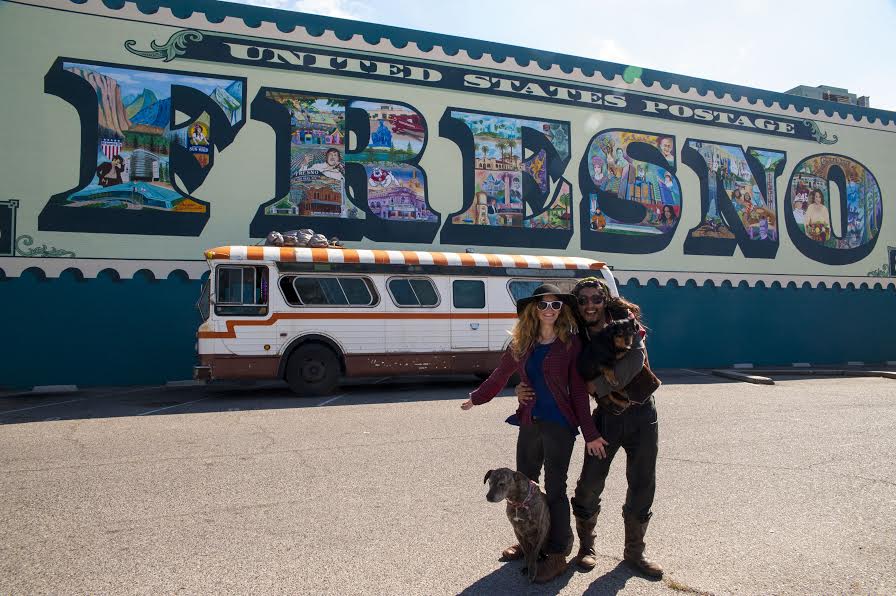A real off-the-grid traveling self-contained crew! Check out R.A.G.E unique story.
What inspired you and your two soul sisters to hit the road in such an eco-friendly way?
Natalie, Caitlin, and I (Jamie) were living in a community that we co-founded called “Roots EcoVillage” in Austin, Texas. The idea for the RAGE Bus Project was born out of a desire to travel and visit other sustainable-minded communities, bringing with us the tools and community-building skills that we had acquired during our time at Roots. We wanted to see what makes communities successful and what makes them fail, with the long-term goal of once again creating a sustainable community in the future. We also had a strong desire to live more harmoniously with the Earth and take another step away from the consumerist based lifestyle. I do want to mention that we are a diesel-powered bus and do not claim to be eco-friendly because of that fact. We do claim to be “self-contained” which means that we are capable of living off of the grid.
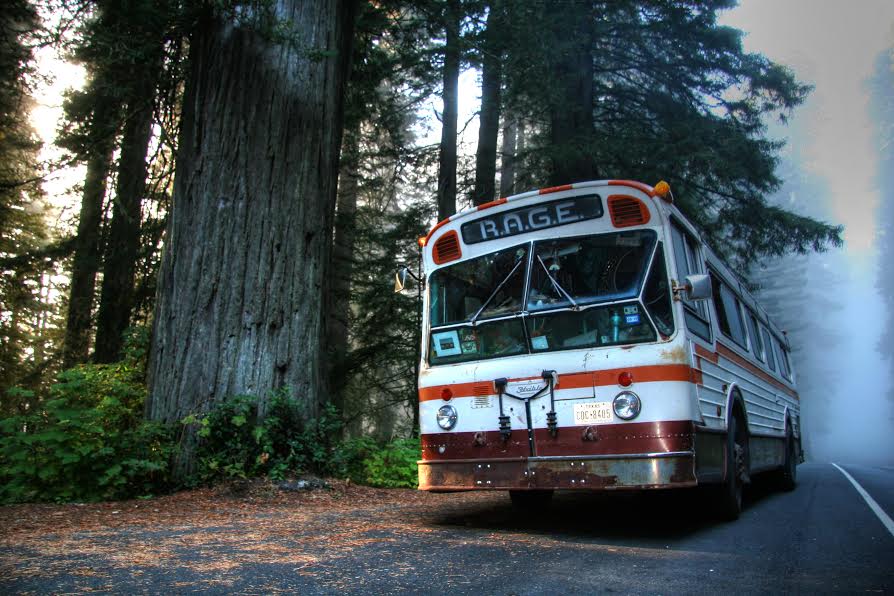
Do you live full time in your bus? What model/year is it ? Any nickname ? Did you convert it yourself ?
The RAGE Bus is a 1966 Flxible “New Look”. Her name is “Bessie,” named by her previous owners. Bessie operated as a downtown LA city transit bus from 1966 to 1982. We have been on the road for two and a half years, traveling through TX > NM > CO > UT > NV > CA > OR > WA > OR > CA. Caitlin went home to go back to school after about a year, Natalie went home for family reasons after a year and a half, and Jesus came onto the bus about the time Natalie was getting off. A few others have lived on the bus for a few weeks at a time, and sometimes we travel in a caravan of people.
We converted the RAGE Bus into a tiny house ourselves using mostly recycled materials. The bus features three sleeping bunks, a wood burning stove, propane stove and oven, a gravity-fed water filtration system, a pedal-pump powered sink, compost toilet, a vegetable and herb garden, solar panels, and a swing (everyone loves the swing).
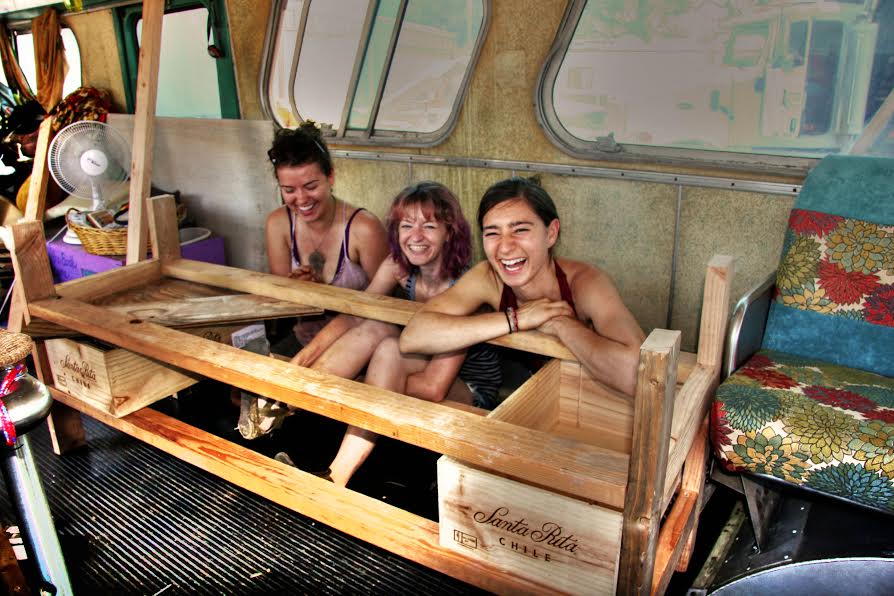
Over the past two and a half years, we have lived at farms, friend’s yards, diesel repair shops, national forests, and BLM land for different lengths of time. We have only paid to stay at a campground a handful of times and we don’t really have a need for the hook-ups at RV parks. Our adventure has led us to arrive in a city and park in different areas until we meet locals that want to hang out with us. We let anyone who is interested come inside and get a guided tour of our conversion and talk to us about what we are doing. Through this experience, we have realized how much this project inspires the people who see it. Over and over again, people say “oh my gosh, I really really want to do this. This is my dream, you are living the dream!” It has opened the door to many great conversations about the next culture shift and what we can do to build a better world together.
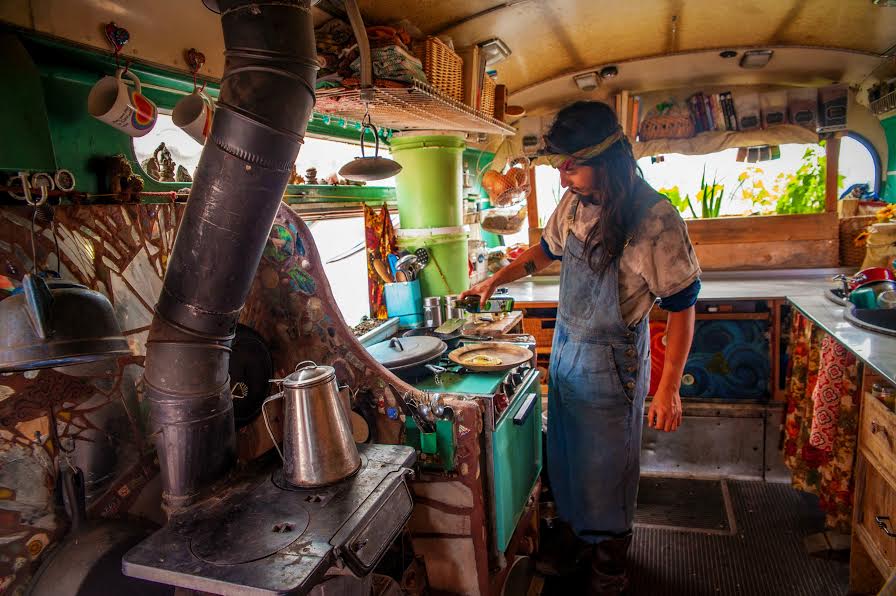
Where are you now and what have you been working on lately?
Today we are living at a really interesting community called “Slab City,” which is located on the East side of the Salton Sea in South California. They call it the “last free place” to live in America and it’s been around since the 1960s. It’s largely a snowbird community, with thousands of people flocking to the Slabs in the winter and the full-timers braving it out through the summer. It’s a beautifully broken place that is both humbling and inspiring. Currently we are on a path east to Texas to renew the state papers for the bus and visit our family and friends along the way and in Austin.
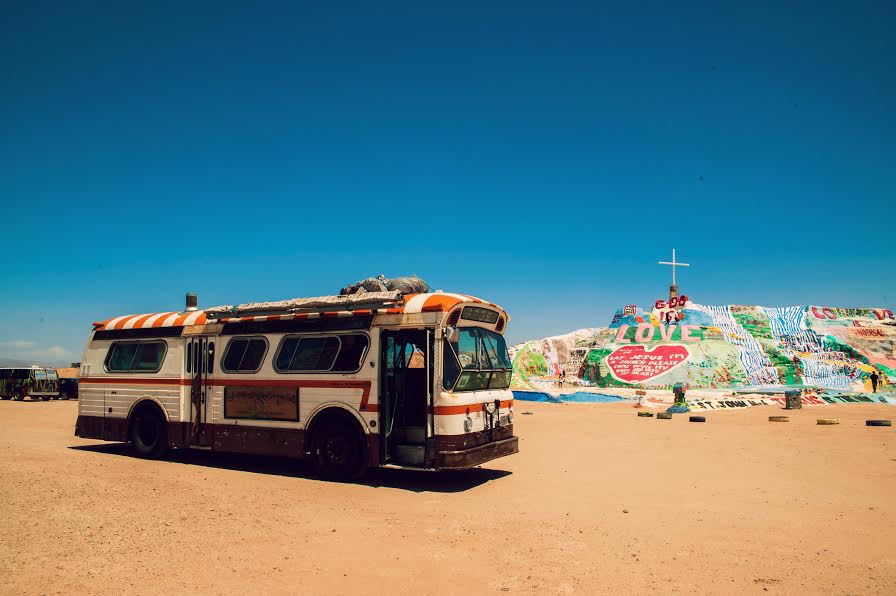
What did you learn from the tiny home/bus life so far? What keeps you on the road?
The bus life so far has been beyond my wildest expectations. I didn’t really expect to work on the mechanics of the bus so much, but I should have since our bus is from 1966 and sat in a pasture in Arkansas for a good twenty years. Since the beginning we have been changing our own fluids, filters, belts, and gaskets and learning about how our engine works. At one point, we had to deconstruct our engine entirely to get our heads rebuilt (we hired a mechanic to help us rebuild it), and we have had to learn how to operate and maintain our air braking system. Learning these skills has not only helped us save money, but it has given us the ability to be able to troubleshoot issues when the bus is throwing a tantrum out in the wilderness somewhere. People are definitely interested when they see us covered in grease and grime messing with this ancient engine. I once had an older man ask me where my husband was while I was checking on a leaking hose. He wasn’t even joking, and got visibly upset when I told him my self-identified male partner was in the kitchen cooking me dinner while I fixed this transmission leak. To me, it’s just my life and I don’t think of it as strange. I also think it’s an important part of our journey to expose our lives to other people and show them that there are possibilities outside of the box.
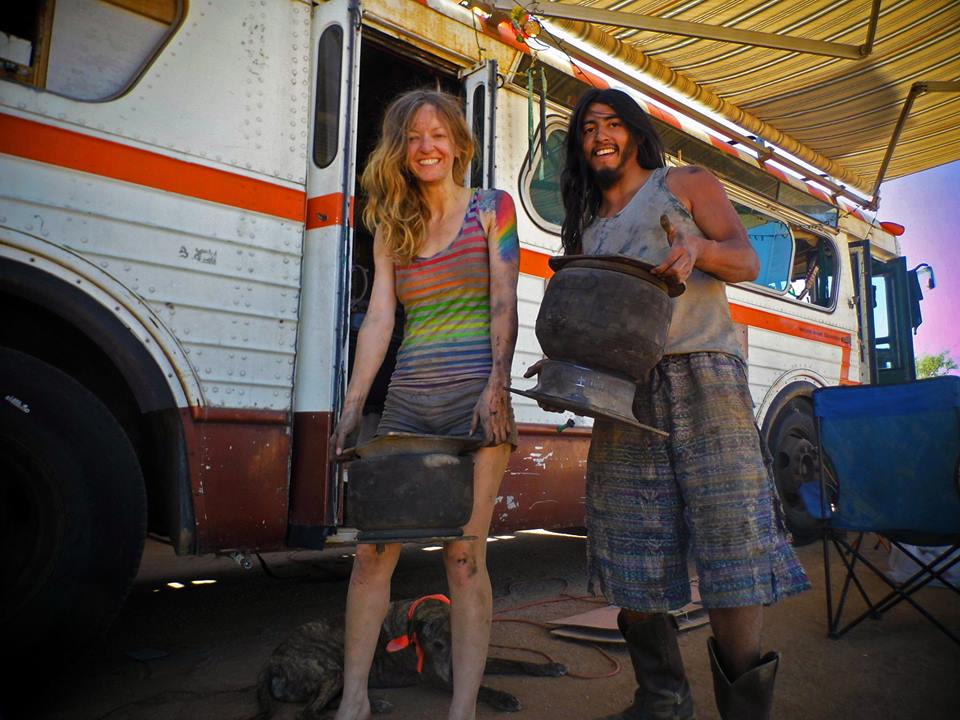
What is your favorite place you’ve visited so far?
Our favorite places are the places where you can’t hear the white noise of passing traffic or the buzz of the power lines. The endangered wilderness. There is something very magical and healing that happens under the canopy of the trees and in the free flowing waters that come straight out of a mountain. We once lived at Umpqua Hot Springs in Oregon for two weeks and it was definitely one of the most beautiful places that we have been too in the bus. Unfortunately and understandably, Umpqua Hot Springs is currently shut down due to abuse and overuse. There is a collective desire amongst all of us to spend time in nature and get out of the smog of the cities, but we must be aware of the impact that we are leaving. Too many people do not understand the absolute necessity of disposing of our human waste in an environmentally responsible manner. Even micro-trash can be detrimental to the Earth, so it’s important to “leave no trace” everywhere we go. Respect your Mother.
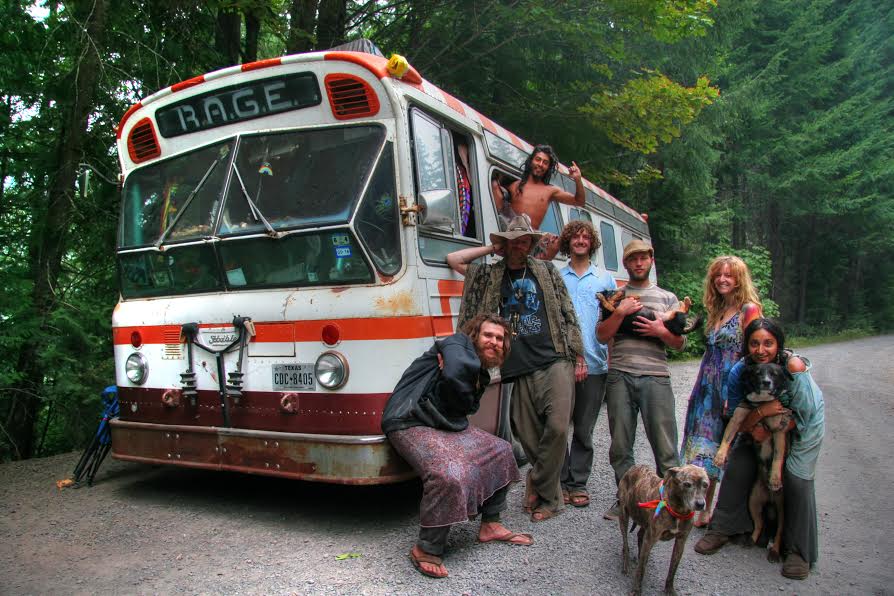
What’s the weirdest thing that happened to you on the road?
Natalie and I were driving the bus through west Colorado (on I-70). Just outside of Grand Junction we decided to check out a canyon on BLM land that was home to one of the last remaining herd of wild mustangs. It was cold and snowy, and Natalie and I would take our dogs out for a walk every day to look for the horses and explore the canyon. One day we heard a goat crying from on top of a cliff on one side of the canyon. We thought it must be a mountain goat, but the goat seemed like it was stuck and it wouldn’t stop crying. It was totally impossible for us to do anything for the goat, and it was getting dark so we went back to the bus. The next morning, someone knocked on the door. It strange for us because we had not seen another person in the three days we had been there. We answered the door to meet a man in his early 50s, with a goat tied up in the back of his truck. “Is this y’alls goat?” he asked. We kind of laughed and said, “No way! We live in this bus… we don’t have a goat! But we are so glad you were able to rescue it!” So we named the goat Cliff and brought the man inside of the bus.
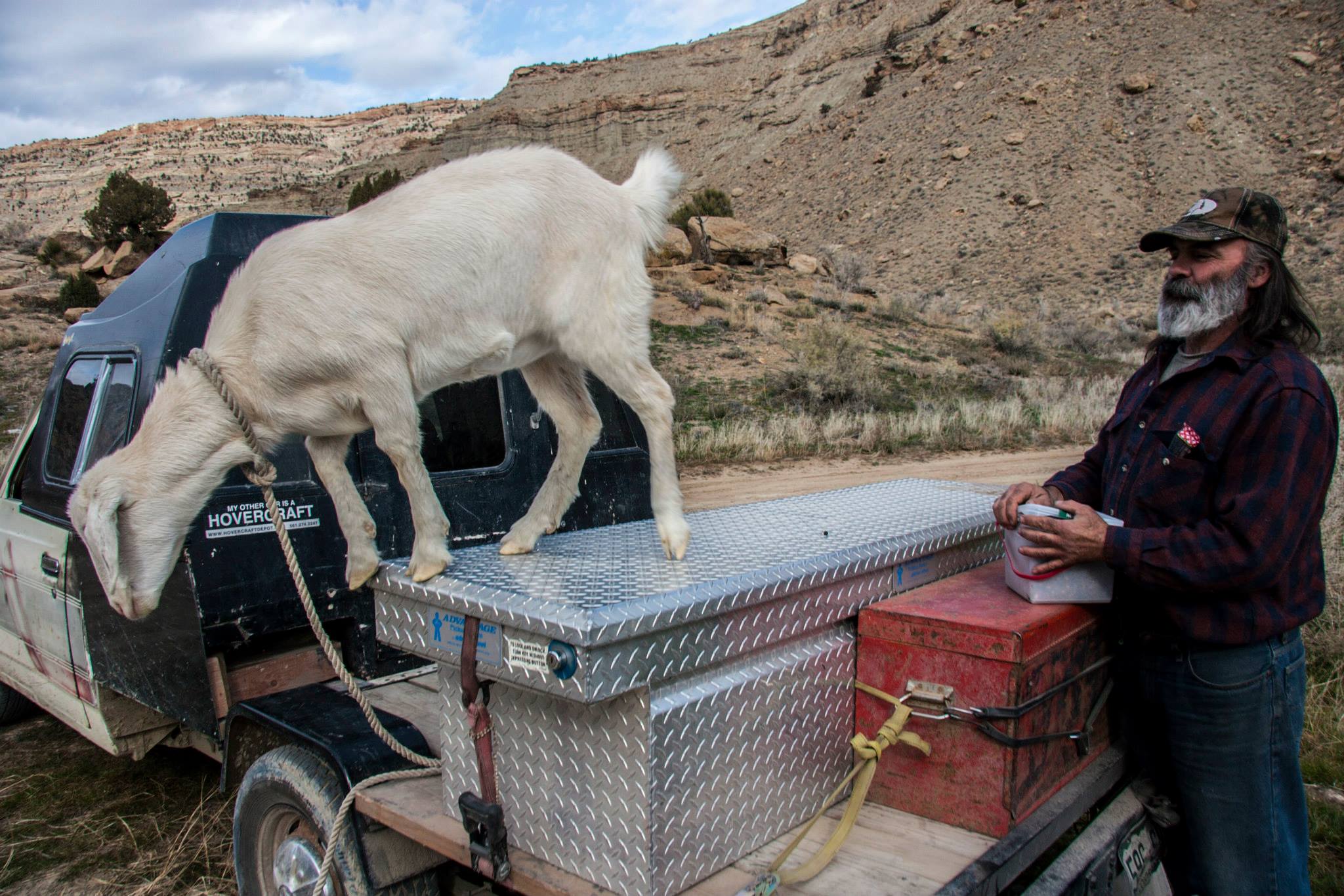
We talked to him for several hours about his life (his name is Dana) and how he rescued this goat at sunrise to prevent the sheriff from shooting it down (he showed us the video!). At some point he mentioned that he was a diesel mechanic by trade. We decided to start up our engine so that he could have a listen and make sure everything was tip-top. Natalie started the engine for him and immediately turned it back off. Something was wrong. With a look of shock, Natalie reached down by the crankshaft and picked up a broken bolt. To us, this was tragic. We had broken these bolts before, in Texas and the mechanics had told us that if they broke again, we were done for. Dana was unphased, and immediately went to work pulling out tools from the back of his tiny truck with a huge toolbox on the back of it. Over the next three days, Dana would return to us with gallons of water (we ran out!) and we worked to extract a total of three broken crankshaft bolts from the harmonic balancer. Dana and Natalie left at some point to go buy new bolts and found a new home for Cliff at the auto parts store! Finally, we got the harmonic balancer realigned and the new bolts locked in tight. We drove out of the canyon and went to Dana’s house to meet his family and say our good-byes. From that point, we continued our adventure west. We have remained friends with Dana to this day and love telling this story as an example of the magical things that are born out of precarious situations.
Give us a useful tip for successful boon docking.
Successful boon docking all depends on successful preparation. We have supplies to last about two weeks off-the-grid if we are careful with our water and the weather isn’t too hot. We do not live with an air-conditioner or a modern refrigerator, so we try to travel with the weather and pay attention to what the temperature is going to be. We are currently traveling to Texas here at beginning of summer, and it’s impossible to keep fresh produce for longer than 2-3 days. We try to park in the shade, keep all of the windows open and keep the fans blowing.
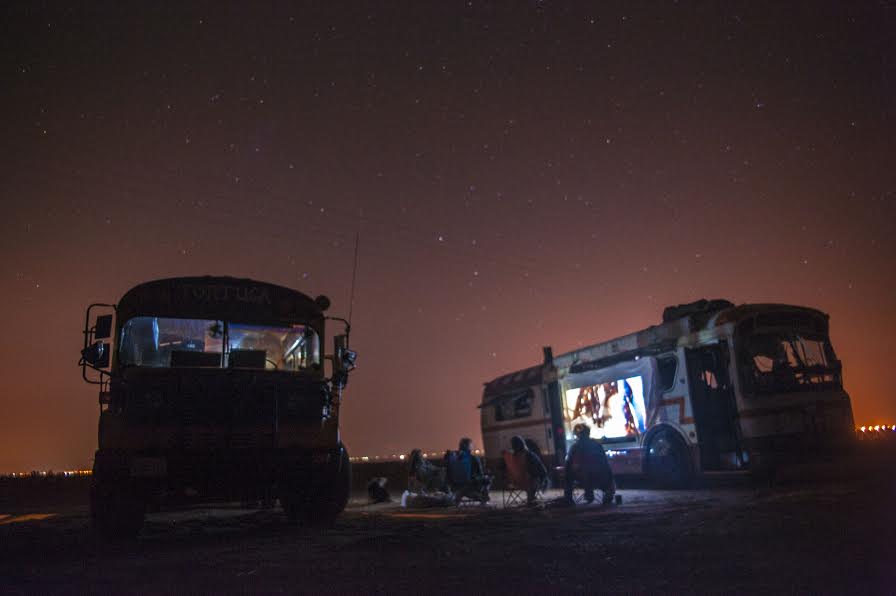
Give us a useful tip for a couple to live in a tiny space.
When Natalie got off of the bus and Jesus got on, we also had four other people join us for the adventure to Oregon and Washington. It was a crazy time to be on the bus! We spent most of our time cooking and feeding people as we traveled up the coast. And washing dishes until we wanted to throw the dishes across the parking lot. After three months the last of our friends parted from the bus to continue their traveling adventures to Mexico, and Jesus and I had the whole bus to ourselves! It felt so liberating and the bus felt so big and empty! We also rebuilt the bed, which was meant to just sleep me and my dog. We have lots of friends that are traveling and living in very small cars, so we are forever grateful for our mansion on wheels.
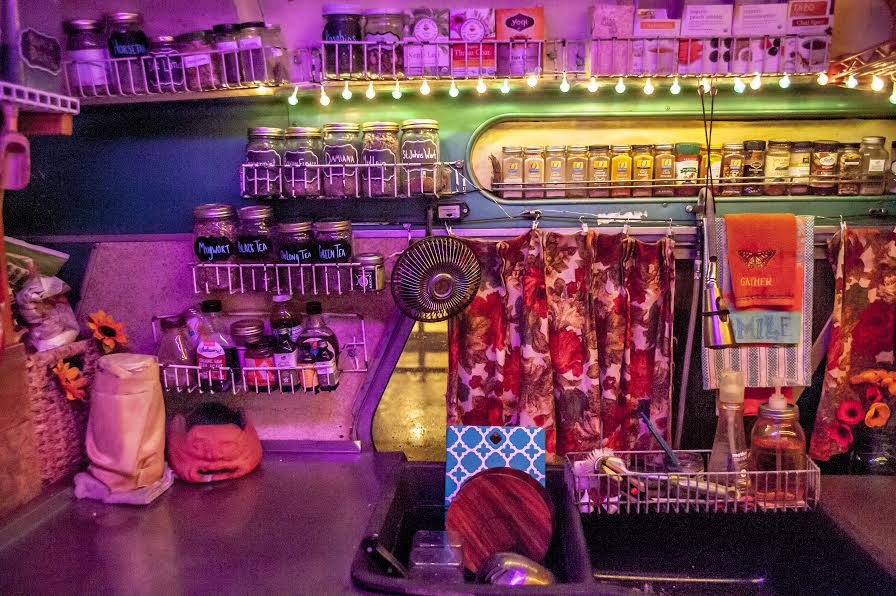
What’s the worst thing about the bus life?
Let’s face it, we are living a non-traditional lifestyle. Much of how we live our lives is considered “criminal” by the state and as a result, we end up talking to the police fairly often (sometimes several times a week, depending on which city we are rolling through). We’ve been categorized as homeless, transients, hooligans, hippies and gypsies. We make money while traveling in lots of different ways. Busking can be really fun if you are creative. Sometimes we play music, we paint faces, we give walk-through tours (for donation) of our bus, and sometimes we sell things that we make. Once I hula-hooped and played the ukulele on the roof of the bus in a parking lot and got plenty of donations to fill up our fuel tank.
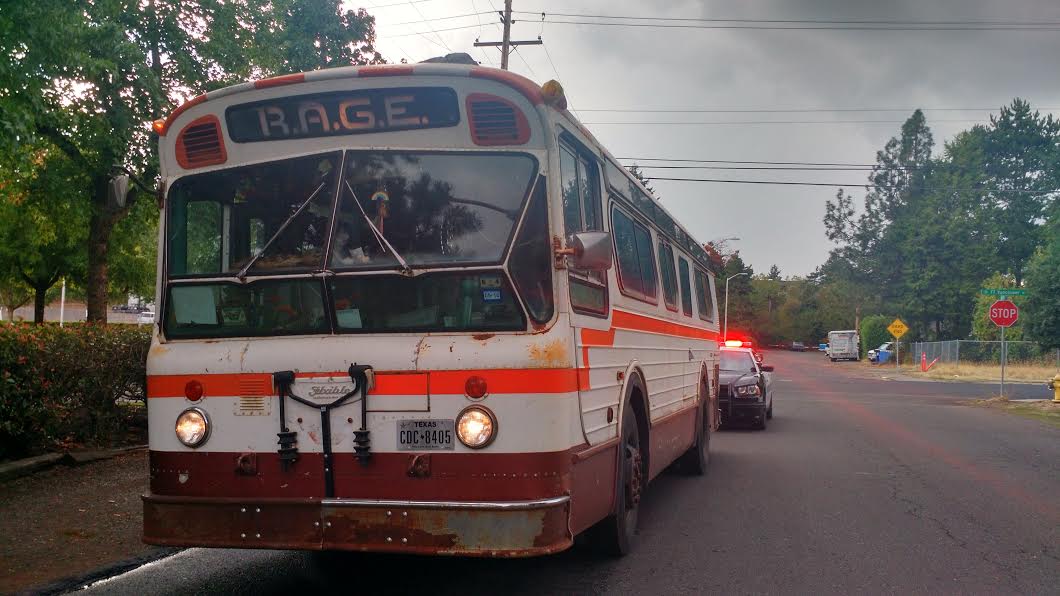
Sometimes the police come and detain us for violating such-and-such code. No sitting on the sidewalk. No loitering. No parking. No sleeping in your vehicle. No camping. You need this permit or that permit. We have regulations up to our eyeballs and I can see so clearly how we have all been boxed in with this dead-end system. I want us to break free. To do something different with our lives. It’s up to us as individuals and as a community to find ways to ween off of this capitalistic-parasite that is killing our planet.
